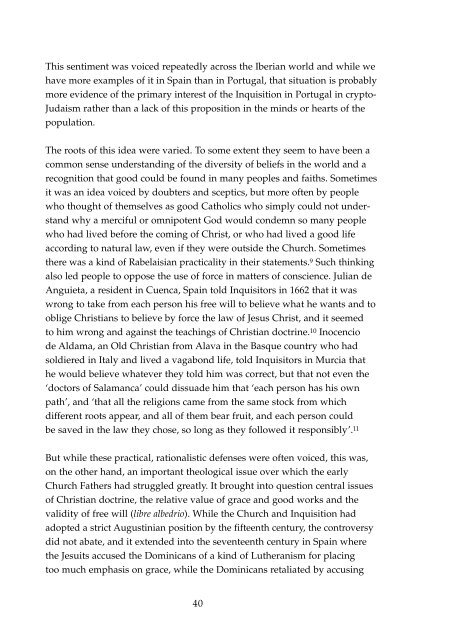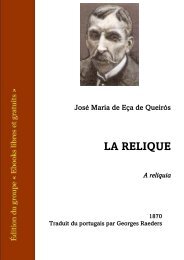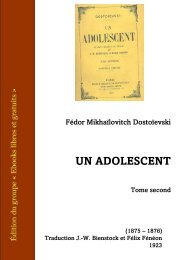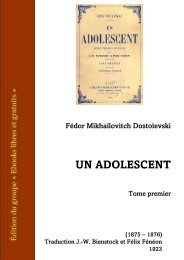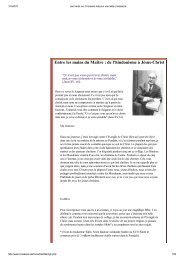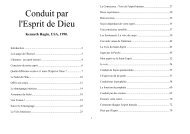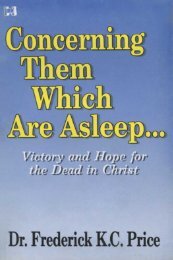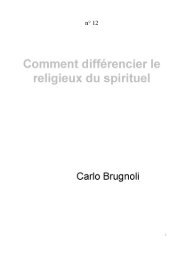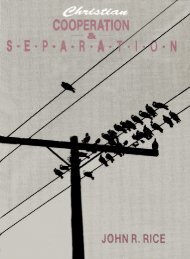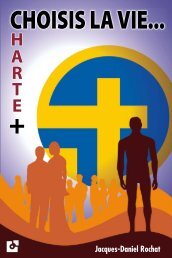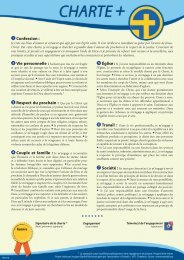The Expansion of tolerance
You also want an ePaper? Increase the reach of your titles
YUMPU automatically turns print PDFs into web optimized ePapers that Google loves.
This sentiment was voiced repeatedly across the Iberian world and while we<br />
have more examples <strong>of</strong> it in Spain than in Portugal, that situation is probably<br />
more evidence <strong>of</strong> the primary interest <strong>of</strong> the Inquisition in Portugal in crypto-<br />
Judaism rather than a lack <strong>of</strong> this proposition in the minds or hearts <strong>of</strong> the<br />
population.<br />
<strong>The</strong> roots <strong>of</strong> this idea were varied. To some extent they seem to have been a<br />
common sense understanding <strong>of</strong> the diversity <strong>of</strong> beliefs in the world and a<br />
recognition that good could be found in many peoples and faiths. Sometimes<br />
it was an idea voiced by doubters and sceptics, but more <strong>of</strong>ten by people<br />
who thought <strong>of</strong> themselves as good Catholics who simply could not understand<br />
why a merciful or omnipotent God would condemn so many people<br />
who had lived before the coming <strong>of</strong> Christ, or who had lived a good life<br />
according to natural law, even if they were outside the Church. Sometimes<br />
there was a kind <strong>of</strong> Rabelaisian practicality in their statements. 9 Such thinking<br />
also led people to oppose the use <strong>of</strong> force in matters <strong>of</strong> conscience. Julian de<br />
Anguieta, a resident in Cuenca, Spain told Inquisitors in 1662 that it was<br />
wrong to take from each person his free will to believe what he wants and to<br />
oblige Christians to believe by force the law <strong>of</strong> Jesus Christ, and it seemed<br />
to him wrong and against the teachings <strong>of</strong> Christian doctrine. 10 Inocencio<br />
de Aldama, an Old Christian from Alava in the Basque country who had<br />
soldiered in Italy and lived a vagabond life, told Inquisitors in Murcia that<br />
he would believe whatever they told him was correct, but that not even the<br />
‘doctors <strong>of</strong> Salamanca’ could dissuade him that ‘each person has his own<br />
path’, and ‘that all the religions came from the same stock from which<br />
different roots appear, and all <strong>of</strong> them bear fruit, and each person could<br />
be saved in the law they chose, so long as they followed it responsibly’. 11<br />
But while these practical, rationalistic defenses were <strong>of</strong>ten voiced, this was,<br />
on the other hand, an important theological issue over which the early<br />
Church Fathers had struggled greatly. It brought into question central issues<br />
<strong>of</strong> Christian doctrine, the relative value <strong>of</strong> grace and good works and the<br />
validity <strong>of</strong> free will (libre albedrio). While the Church and Inquisition had<br />
adopted a strict Augustinian position by the fifteenth century, the controversy<br />
did not abate, and it extended into the seventeenth century in Spain where<br />
the Jesuits accused the Dominicans <strong>of</strong> a kind <strong>of</strong> Lutheranism for placing<br />
too much emphasis on grace, while the Dominicans retaliated by accusing<br />
40


